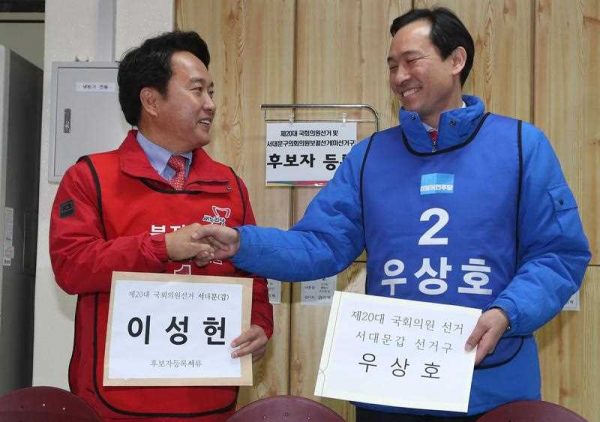Meanwhile, party fissures were put on full public display with dissent over candidate nominations and party platforms accompanying open conflicts between party leaders. The dissolution of the opposition New Politics Alliance for Democracy, the splintering of the ruling Saenuri Party and the establishment of the new People’s Party — all coming just months preceding the legislative elections — underline the high stakes involved.
The outcome of the legislative elections promises to translate into political leverage to set the platform, viability and credibility of candidates for the presidential elections in 2017. The electoral situation remains far from settled for all parties, even in traditional strongholds, as the number of undecided voters has increased rather than declined as election day nears.
Surveys conducted by Gallup Korea estimate the number of undecided voters sits at 27 per cent; that figure is six per cent higher than in December 2015 and points to a growing ‘party apathy’ among voters. Yet this party apathy is not synonymous with political apathy. Events such as the 14,000-strong protest in December against the government’s labour policies and revisions to national textbooks indisputably show public passion and involvement in politics. What the party apathy shows is that the platforms and issues presented by the political parties do not provide an outlet for that passion.
What, then, are the platforms of the parties, and why are they failing to ignite voters’ interest? ‘Economic democratisation’ is one key idea; but, that concept moved out of President Park Geun-hye’s Saenuri Party — along with her 2012 campaign strategist, Kim Jong-in — into the opposition Minjoo Party. President Park replaced it with the concept of a ‘creative economy’ following her successful election. Kim, a former four-term lawmaker, quit the party in 2013 as a result. In reviving the theme of economic democratisation, the Minjoo Party stands to highlight the ruling Saenuri Party’s policy back-pedalling, if not policy failures. But it also opens itself up to the criticism that it lacks fresh ideas.
This lack of fresh ideas has been used to explain conflicts over reform and high-profile splits in the opposition bloc. Representative Ahn Cheol-soo, co-founder of the opposition coalition, the New Politics Alliance for Democracy (NPAD), left the bloc in December 2015 following open disagreements with NPAD’s then-chair, Moon Jae-in. Representative Chun Jung-bae, who also quit the NPAD in 2015, joined up with Ahn to form The People’s Party, formally launched in February 2016. The People’s Party challenges the opposition Minjoo Party in its traditional strongholds of Gwangju and North and South Jeolla provinces.
At the same time, the fledgling People’s Party has faced the overriding task of achieving and maintaining the 20 legislative seats that is the minimum size for a legislative bloc to be accorded rights to negotiate legislative calendars and receive higher state subsidies. This has consumed some of the dynamism that would otherwise drive its momentum.
For the ruling Saenuri Party, national security issues loom front and centre, exemplified by President Park’s counter-terrorism bill — which has been condemned for widening the authority of the National Intelligence Service. The bill triggered a 193-hour opposition filibuster in the Senate before passing resoundingly due to the ruling party’s support. In the face of North Korea’s recent bellicosity, Saenuri’s national security stance is a safe bet. Still, the dim economic outlook for the country, as well as concerns about the gradual encroachment on civil rights and liberties, may mean that this strategy is not enough to galvanise public support.
With at least two parties battling over liberal voters, the conservative Saenuri Party until recently still looked set to coast to victory. At the beginning of the 2016, political pundits and analysts did not rule out a 180-seat majority win for the party, which would allow it to pursue its legislative agenda unimpeded. That possibility has eroded: internal discord between pro- and anti-Park factions within the party has led to fights over candidate nominations and the departure of senior Saenuri Party members to run as independents. Recent polls show Saenuri losing support in its traditional strongholds to the extent that it is now battling to ensure that it does not lose its legislative majority.
The legislative election’s outcomes are far from determined. Former Minjoo party leader, Moon Jae-in, has announced that he will quit politics — and abandon his possible presidential run — based on the results in the opposition party’s strongholds. Representative Ahn Cheol-soo’s consideration of a presidential run is significantly tied to the performance of his People’s Party beyond those same strongholds, as the party’s results there will provide a gauge of its broader appeal. Meanwhile, the outcome for Saenuri will affect President Park’s influence on the party’s choice of presidential candidate for 2017. Clearly, then, this will be a high stakes election for all concerned.
Fiona Yap is Associate Professor at the Crawford School of Public Policy, The Australian National University. She sits on the Advisory Board of the ANU’s Korea Institute.

